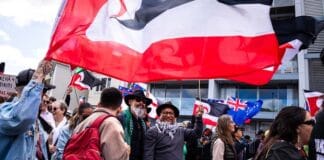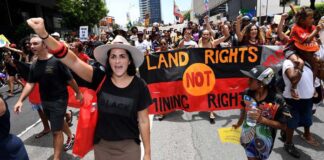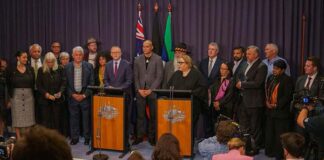In the week before Christmas, the Morrison government publicly committed to support the creation of a new Indigenous Voice to Parliament and Government.
This proposal would see 35 regional “Voice” bodies set up across Australia, along with a peak national body, with a mandate to advise all levels of government on the development of policy and legislation concerning Indigenous peoples.
Tom Calma and Marcia Langton, the Indigenous co-chairs who led the design of this proposed Voice, continue to insist on the need to implement the Uluru Statement from the Heart, which calls for a “Voice to Parliament” to be enshrined in the Australian constitution.
While the Liberals have flat out rejected a referendum on a Voice, Langton, Calma and many other Uluru Statement supporters are hoping that this legislated Voice might be a stepping-stone to constitutional enshrinement. Morrison has announced his support so late in his term, however, that there is virtually no expectation he will deliver legislation before the next federal election.
Meanwhile, Labor has attacked the proposal for falling short of constitutional enshrinement. Labor plans to campaign for a referendum on the Uluru Statement as the centrepiece of its Indigenous Affairs policy through the upcoming federal election.
In reality, the legislated “Voice to Parliament” model Morrison now supports and the Uluru Statement model are practically the same. They both propose advisory bodies which would have no control over resources, no power to set policy direction and could be quickly dissolved by legislation by the government of the day.
This is a weak shadow of the historic demands for self-determination and sovereignty advanced by the Aboriginal rights movement over generations.
Intensifying oppression
The current policy framework for Indigenous affairs was largely established by the Howard government, which waged war on Aboriginal self-determination from 1996-2007.
Howard slashed funding for community-controlled services, abolished the Aboriginal and Torres Strait Islander Commission, attacked Native Title and Land Rights and launched the NT Intervention, creating a level of racist control over Aboriginal lands and lives not seen since the Protection era.
When the Rudd government took power in 2007, it continued the Intervention, rolled the punitive Income Management system into many more Indigenous (and some non-Indigenous) communities, dismantled funding for essential services in remote areas and axed the community-based employment program (CDEP), which had once employed more than 40,000 Indigenous people.
This enforced disempowerment and poverty has been accompanied by a large expansion of police, child-protection and other punitive programs. The numbers of Aboriginal children being forcibly taken from their families is higher than ever, with almost 1 in 10 children spending time in a foster placement in 2020.
The rate of Indigenous incarceration is also higher than ever, with the grim tally of deaths in custody since the Royal Commission in 1991 now standing at over 500 deaths.
Government-backed reports and rounds of consultation on constitutional recognition and now a “Voice to Parliament” have provided a useful alibi for Labor and Liberal governments alike, who have both postured about their commitments to serious reform while daily oppression grinds on.
Radical opposition
Labor point to opinion polls indicating strong support for a referendum among Indigenous people and supporters. But there has also been consistent opposition to a referendum on a “Voice to Parliament” from more radical Indigenous leaders and community organisers.
This is no surprise, given that the “Voice to Parliament” proposal initially came from conservative Indigenous commentator Noel Pearson, and was deliberately designed to bring the business community and the right-wing of the Liberal party on side with constitutional reform.
The Business Council of Australia, Qantas, even Rio Tinto which recently blew up a cave at Juukan Gorge that had been occupied for 46,000 years, all support a constitutionally enshrined Voice precisely because it poses no threat whatsoever to their power.
A group of more than 20 elected representatives walked out of the Uluru conference in 2017, denouncing the proposal as tokenistic and predetermined. Wiradjuri delegate Jenny Munro said constitutional recognition was “about validating their sovereignty [the Crown] on our land, not ours”.
Significantly, opposition to a referendum is concentrated among Indigenous activists who organise street demonstrations, such as Warriors of the Aboriginal Resistance, who have been behind huge Invasion Day and Black Lives Matter marches in recent years. Greens Senator Lidia Thorpe is also opposed.
Labor claims that an enshrined Voice would be a transformative step towards negotiation of treaties across Australia. Its current record shows that this too would largely act as a distraction from serious reform.
In the NT, Labor is overseeing a Territory wide treaty-making process while also increasing police powers against Aboriginal youth, leading to a recent explosion of children locked up in the notorious Don Dale detention centre.
In Queenland, Labor has also started a treaty process while pushing ahead with the Adani coal mine against strident opposition from Wangan and Jagalingou traditional owners.
This year marks 50 years since young Black activists established the Aboriginal Tent Embassy in Canberra. They did so following widespread disillusionment with the failure of a 1967 referendum on Aboriginal citizenship rights to deliver meaningful change.
This radical movement was a historic high-water mark, winning reforms that Howard was still working to wind back 30 years later. The co-ordinated mass politics, direct action and solidarity with other struggles of working and oppressed people seen in this era is needed to win real change today.
By Paddy Gibson





